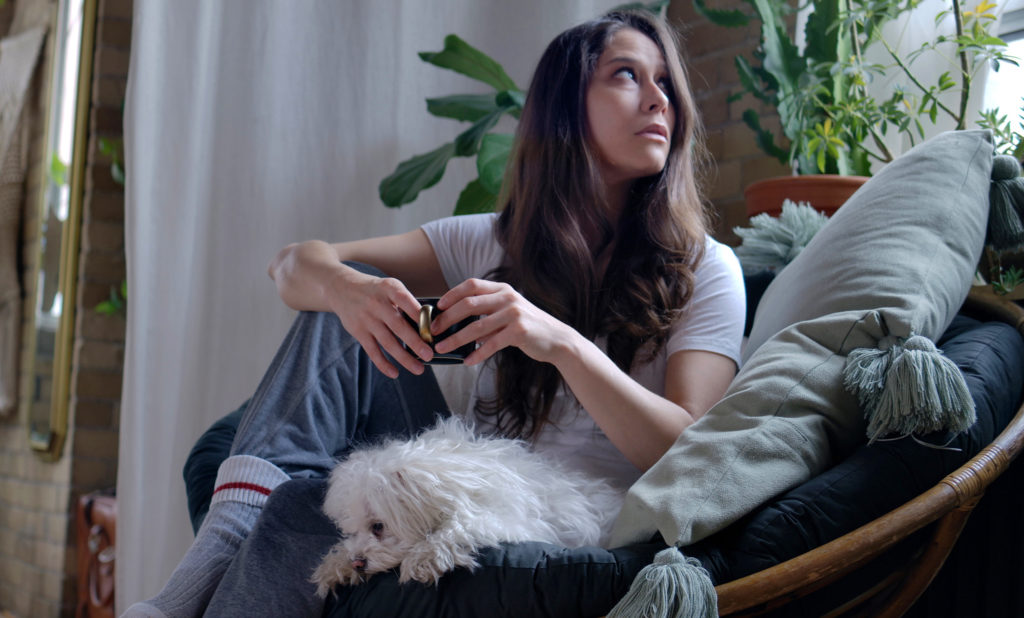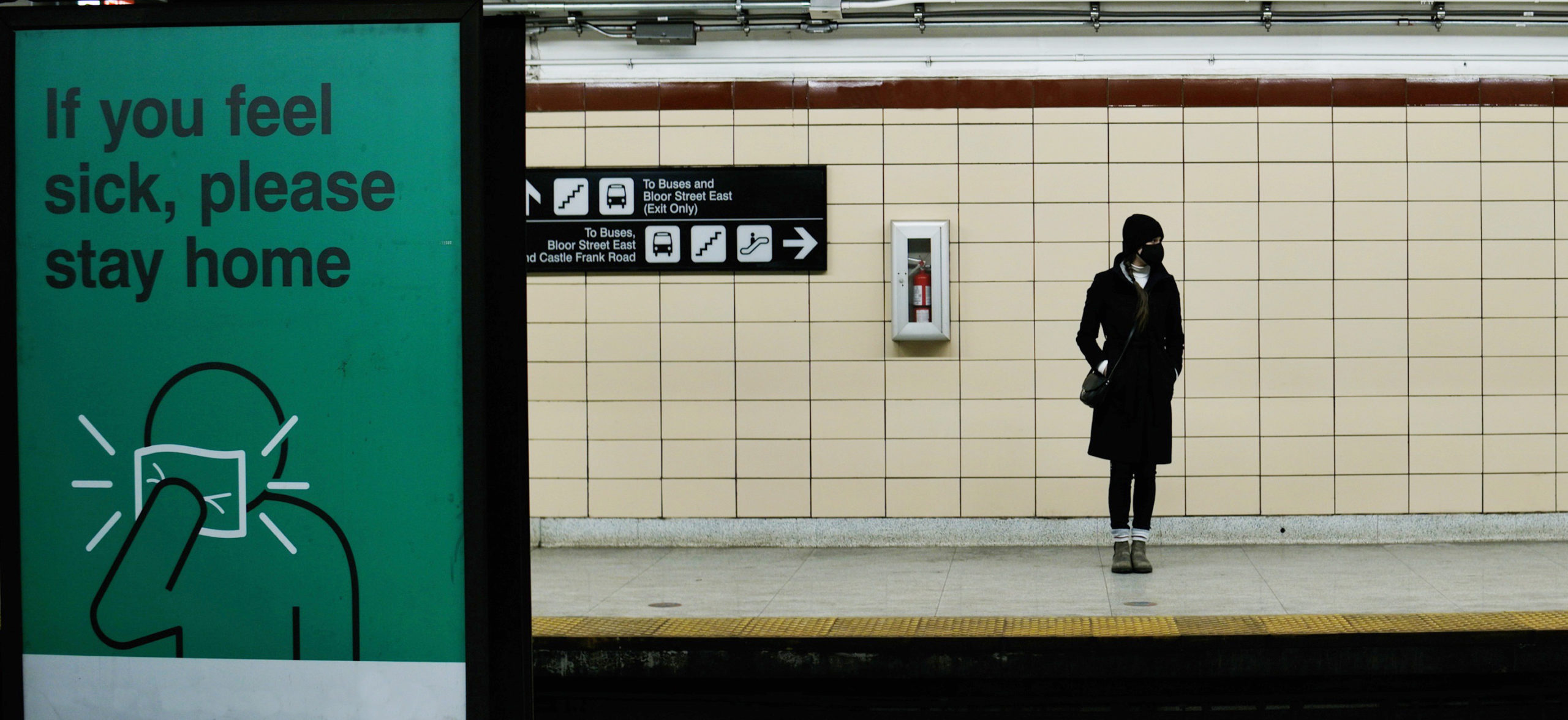We begin with a Monthly Planner clipped to a fridge. Natalie, a dedicated young actor, has marked her upcoming agenda for the next few weeks. Rehearsals. Voice lesson. Costume fitting. More rehearsals. Appointment with agent. Call sheet in hand, she rushes to leave her apartment for the theatre when her cell phone buzzes. Engagement cancelled. Natalie is stunned. 12 days pass. An email arrives. Contract annulled. It is March 26, 2020.
We end 400 days later with Natalie at her apartment window, gazing out on another empty gray day. More than a year of her life has vanished, her career all but evaporated. Her little dog, Molly, scuffles for attention at her feet. Natalie smiles softly. What was once a headlong rush into the arms of shock and fear has somehow, almost without her knowing, morphed into a quest for strength and self-belief.
400 Days Later, a first film by Stephen and Angela Bell, sensitively tendered, exquisitely crafted, more than merely mirrors our times. It all but surmounts them. With a boundlessness of caring and limitless heart, the 9 minute, 45 second short unfolds in a stream of minute, meticulously observed details.
Opera Going Toronto reached out to the husband and wife team to discuss the project, its genesis and realization.
* * *
400 Days Later — The Interview
Angela, your screenplay feels extremely personal and yet somehow vastly more inclusive. What was your reference point when you were writing? And part two to the question — was that reference point in any way different when appearing on camera playing the one and only principal role in the film?
When I was writing it, to one degree it is definitely personal. But it’s a story based on the experiences and the many other stories that I have witnessed during this time. My background is film. And Natalie’s background is theatre. A great deal of our close family and friends are in theatre so I have witnessed their struggles. I have witnessed their courage and their fortitude during a time when an entire marketplace, an entire world, is basically saying they can’t do the thing that their souls are telling them they’re meant to do. But I also wanted to touch on people who are facing this time by themselves. I wanted to write something in a way that paid tribute to their struggle and paid tribute to how hard it’s been for them. As for when I was playing Natalie — she is an accumulation of many stories so, as much as I could bring my understanding of the uncertainty she feels — I certainly have felt that myself — at the end of the day, she isn’t me. When I stepped into her character, I tried to take all the pieces of her life, to approach her like a blank slate incorporating all the different colours and different characteristics of people I admire.
Stephen, a question for you. This has been a year of remarkable professional growth for you as filmmaker/videographer. Are you reconciled to the creative pivot you’ve made? There was a time, not so long ago, when you were singing as a chorister with the COC. Do you see the video production side of things ultimately pushing the singing off stage? Is that at all conflictual for you?
It’s been a very interesting time. Singing has always been a part of me and I don’t think singing will ever leave me. But what the pandemic has done, it’s enabled me to utilize some of those skills on commercial projects. When I work with those clients I try and create on film what I’ve learned in music. But now with the demand for video and the interest in narrative work and documentaries and all sorts of visual media, my interest now is to focus more towards video. I don’t think singing will be something I’m going to step away from but, at the same time, I’m really inspired to see what I can do with film. How I can tell stories. Any time I can pick up a camera and work with my crew to create something, it inspires me in a way that singing hasn’t. Video is definitely a new passion.
You referred to music informing your work as a filmmaker. Do you see a sort of cross-referencing, cross-fertilization of experience, singer vs. filmmaker, at work here?
I do. I mean obviously, an actor or singer on stage in opera, we don’t deal with the microcosm of what video is partly because we’re projecting to a three thousand person audience or two thousand person audience or whatever the house is as compared to projecting to a film crew. However, that kind of idea of being turned on and being present in a moment works in film as well as music. Theatre’s not that far from film even if you’re not amplifying to the back of house. You’re amplifying to a 35 mm. lens or a 55 mm. lens. I think you can still translate the idea. Peter Sellars and Robert Carsen and all these wonderful directors, their productions, from a visual point of view, I never really see on stage because obviously as a singer you can’t just turn a camera around like you could shooting film. But the idea of what they’ve done visually, after looking at stills, I try to emulate that — showcasing the individual, showcasing the micro as well as the macro. I think that’s definitely prevalent in my films.
Are there any filmmakers you particularly admire? Anyone you’ve been influenced by?
There are many obviously. Atom Egoyan’s work. Huge fan. Wes Andersen and his style of videography. Sarah Polley. Sam Mendes. The idea of the continuous single shot. Every filmmaker is different and also every experience is different when you weave your production together. That being said, when it comes to the style of shooting in our film, we use an anamorphic style with a very wide point of view plus crop bars top and bottom. I love shooting in that style. Also used in Messiah/Complex. Shout out to AtG.
Last question. Angela, do you find you’ve had to develop any particular coping strategies as an actor to get you through the past year? How have you dealt personally with the impact COVID’s had on your industry? What have you learned?
I’ve gone through so many different stages. Acting is all about the hustle. It’s all about the next booking. It’s all about the next selfie you take of yourself. There’s this constant sense that if you’re not working, your career is not progressing. I think the key learning I’ve taken from this time, the thing that has been honestly getting me through each day is that working on yourself is as good as booking the role or going to the next career step. I’ve had the opportunity to do a lot of online training at various acting schools around the world and connect with a lot of other actors. I think as a performer or any creative person, the key takeaway right now is to do whatever you have to do to survive. To pay the rent. It’s not a failure to take a job that’s not necessarily related to the craft as long as you keep working on the craft in some way whether that’s something as simple as picking up a used acting book and reading it each day. If you start to judge yourself based on the lack of jobs, you can go to a very dark place. Take care of YOU, mentally and physically. It’s ok not to be ok. It’s ok to have days when you feel sad. It’s ok to have days when you doubt yourself. As long as you pick up your feet and just try to get through the next day.
Thank you. I think that’s so important to hear.
400 Days Later — The Review
Poignant and pointed, 400 Days Later instantly seizes attention — the title alone intrigues — a stirring, distinctly cinematic testimonial to all that is brave and good in us, vibrantly expressed, lovingly realized. Acting as director, DoP and editor, Stephen Bell exhibits a singularly deft hand allowing the full force of the narrative to flow smoothly and unencumbered, shooting within fixed frames, lingering on shots, allowing action and story to unfold dynamically and fully. A crisply focused, classic approach to filmmaking, respectful, measured, assured.
Screenwriter/producer/principal actor Angela Bell’s Natalie is a study in dignity and grace, an abiding source of deeply affective close-ups. Her character’s sadness and fugitive smiles strike straight to the heart. Her loneliness and confusion are palpable. A particularly devastating scene highlighting a rendezvous in Trinity Bellwoods Park with an old friend turned successful corporate climber — masterfully played with perfectly pitched tone deafness by Madeline Leon — tears at the emotions, a moment of powerful resonance, a timely and timeless human vignette.
In many respects, 400 Days Later, speaks far beyond the interminable COVID-driven crisis confronting the performing arts. Theatre closures, collapsed incomes, lost professional opportunities are unquestionably all part of the film’s ominous geocultural landscape. But there is, perhaps even more compellingly, an urgency, a potent impulse to give voice to the human spirit at large at work here as well — the unmasking of identity, the need to build and strengthen a sense of self.
A resonant quote courtesy Rainer Maria Rilke closes the film, a ringing affirmation of the durability of life, a zooming out from one young actor’s determination to survive in the face of chaos and cruel personal loss to a much broader narrative context.
Let everything happen to you
Beauty and terror
Just keep going
No feeling is final.
We are all players on the pandemic stage. We are one and all alone. Hope, we hope, will find us.
We’ve almost reached the borderline, Corinna Rose and the Rusty Horse Band sing as the credits roll.
* * *
Winner of Best Drama Short at the Changing Face International Film Festival in Sydney, Australia, 400 Days Later will be available for general release late 2021. Trailer available at https://vimeo.com/542895797



